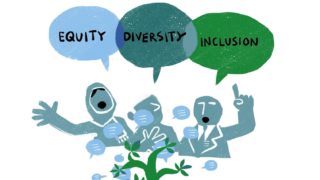
Equality Diversity and Inclusion toolkit
This toolkit contains key lessons learnt during the Forest Governance project and aims to orientate research institutes trying to integrate an Equality, Diversity and Inclusion (EDI) perspective in their practices with key recommendations within North-South or South-South collaborations.
Reflecting on the modalities of North-South partnerships is essential in order to implement more just relationships with partners based in the Global South and to challenge established power relations that often reproduce neo-colonial patterns. The establishment of equitable partnerships among research institutions concerns giving access to decision-making processes as well as setting up working practices that respect cultural diversity.
- Clearly define decision-making arrangements. In order to avoid forms of ‘formal’ and not ‘effective’ participation it is essential for all participants to know what in the project is negotiable and what is not. Using the S. R. Arnstein’s ladder of participation (1969) – a framework that identifies different types of participatory spaces ranging from no participation to effective participation – was useful as a map of different decision-making arrangements. On the basis of the framework the possible decision-making arrangements described in Figure 1 were defined.
Figure 1: Description of decision-making arrangements
Decision-making arrangement in the project |
Corresponding level in the ladder of participation |
Equal decision sharing |
Citizen power (Effective participation) |
Co-definition of research objectives and research methodologies |
|
Some important decisions delegated to the institutions based in the Global South |
|
Institutions based in the Global South are consulted and their opinion has some influence on the decision-making process |
Tokenism |
Institutions based in the Global South are consulted but their opinion has no influence on the decision-making process |
Non-participation |
- Ask the project’s partners to clearly define what spaces of independent decision-making arrangements they require to establish limits on what decision-making processes should not be interfered with, in other words, the definition of the research objectives and research methodologies.
- Establish a monitoring and evaluation process to check on the ways in which the established agreements on decision-making arrangements are being respected. (You can see our EDI survey here.)
- Establish an anonymous channel that can be used by partners to ask for mediation with the leading institution or to complain about the lack of respect of decision-making arrangements. This should be done by an external consultant or another focal person working on EDI who should not be directly employed by the leading institution or should have some space to present independent and critical feedback to all the project participants including the leading institution.
- Take into consideration the partner’s preferences and possible cultural differences in relation to working hours, national bank holidays, language needs and preferred forms of communication for everyday practices of project management. This can be done by researching the national contexts but should also be directly discussed with all partners. Collective dynamics that involve the discussion of cultural stereotypes and working habits can be good ice-breakers to open these conversations.
- Have open collective discussions about personal implicit biases, cultural stereotypes and mutual expectations that have the potential to influence relationships with partners if not discussed with transparency. This should ideally be facilitated by an external consultant or an EDI focal person that can act as a neutral mediator during the discussions.
- Establish clear and transparent authorship rules for research outcomes and just intellectual property rules. In this project, for example, we adapted the APA Autorship Determination Scorecard to the activities developed in the research project.
The inclusive management of internal meetings and external events that see the participation of a variety of actors from different cultural contexts and of different social identities requires the acknowledgement of such diversity and the implementation of strategies that encourage the effective participation of all stakeholders.
- Consider translation and live interpretation costs in the project budget and do not assume that the working language of the project should be English or that of the leading institution.
- Implement a facilitation style that makes everyone feel comfortable by introducing ice-breakers, collective dynamics and opening discussions that allow the participants to feel at ease.
- Avoid academic jargon and mind the level of complexity of the language used during the meeting.
- Always complement the verbal communications in meetings with written material: presentation with key messages of the speech can help non-native speakers in following the discussion.
- Send written summaries with main takeaway points after each meeting, roundtable or event.
- Encourage the active participation of all stakeholders by asking direct questions to those whose age, gender or professional level may not feel comfortable participating.
- Avoid giving too much time to some participants at the expense of other participants’ possibility to intervene. If necessary, set a time limit to make sure that everyone has equal possibility to express their opinion.
- Consider the potential cultural sensitivity of some topics by asking the partners beforehand if they feel comfortable having certain conversations.
- Know the literacy level of all project participants and take it into consideration when defining the meeting dynamics.
Considering EDI principles in the project’s research methods is key to including the voices of a diversity of stakeholders in the research outputs or to acknowledge the lack of such diversity and make sure to address it. In our project, we elaborated several training materials related to research methods which you can read here.
- Consider EDI principles when selecting the research sample and strive to make it as diverse as possible considering a variety of factors such as age, gender, ethnic identity, race, sexual identity.
- Adapt your research methods to the diversity of research participants and learn about age-sensitive, gender-sensitive and participatory research tools.
- Consult bibliography and methodological proposal elaborated in the geographical context of the research that may not be written in English and can be particularly relevant for the analysis of a given case-study.
- Consider travel expenses in the budget allocation required to reach those stakeholders that lack access to the internet and would be excluded by limiting the travel expenses or by only conducting remote data collection.
- Adapt your research methods to be inclusive of illiterate subjects or to participants with low educational levels.
- Openly discuss your personal and institutional position and how this can frame the research outputs by excluding certain stakeholders to take part in the project.
- Consider the need to have different data collectors or interpreters according to the identity, language and needs of different research participants.
Moving from an extractivist academic model to a socially just one implies considering the needs and interests of the research participants in the research outputs and making sure to make them relevant for the national context including the marginalized actors that may have participated in the project.
- Consider how the research outputs can be made relevant for national debates and national stakeholders (i.e. publishing findings in local languages) and include such expenses in the project budget.
- Support the national and international networking of partners in the Global South in order to make sure that the research outputs are considered in both national and international decision-making processes. Avoid speaking for the partners in international spaces rather than giving them direct access to such spaces.
- Elaborate devolution strategies to report back to all research participants the results in ways that are meaningful to them. (You can see a presentation on possible devolution strategies here).
- Consider the costs of translating research outcomes to different languages.
- Elaborate strategies to reach non-academic audiences that could have low educational levels.
Incorporating EDI principles in North-South research projects implies restructuring working habits and research practices on several levels. Such changes may feel uncomfortable as they mean questioning one’s personal and/or institutional privilege as a researcher working in an institution based in the Global North but are indeed needed to move away from a neo-colonial research framework. Spaces to openly discuss the implicit power relations and cultural assumptions that frame these partnerships are essential in order to challenge business-as-usual practices and move towards more equitable arrangements.
An important takeaway of our project is that capacity-building on EDI is required for institutions based in the Global North who work across such research partnerships in order to give such institutions a space for reflecting on personal and institutional position. On the other hand, institutions in the Global South need to negotiate more equitable partnership arrangements that allow them to bring their own expertise and knowledge in international debates.


